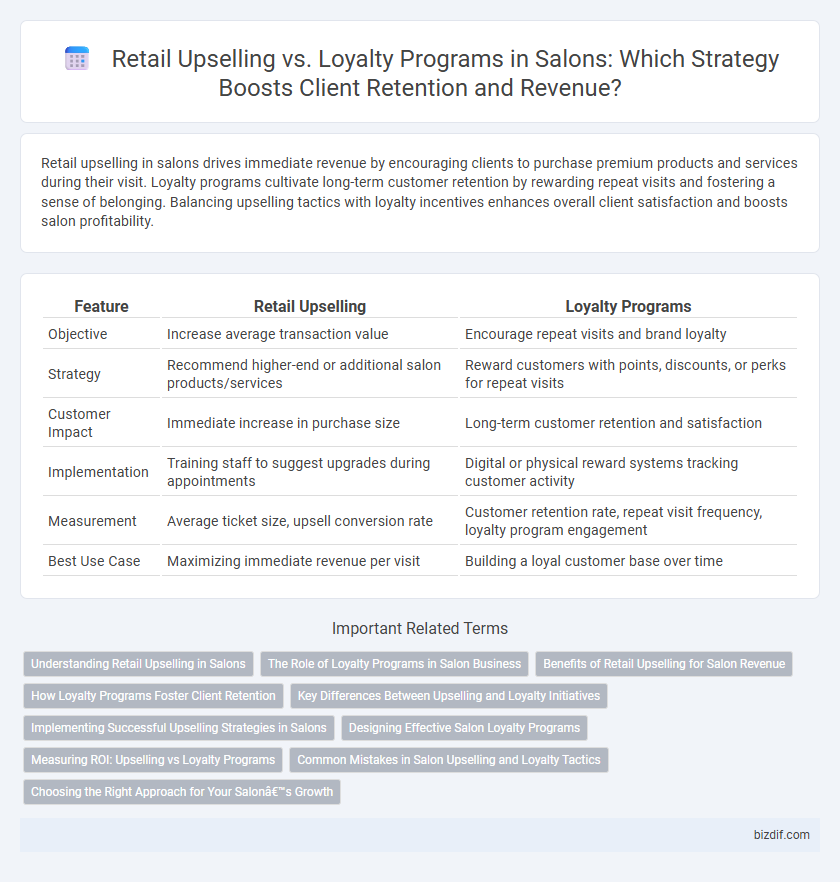Retail upselling in salons drives immediate revenue by encouraging clients to purchase premium products and services during their visit. Loyalty programs cultivate long-term customer retention by rewarding repeat visits and fostering a sense of belonging. Balancing upselling tactics with loyalty incentives enhances overall client satisfaction and boosts salon profitability.
Table of Comparison
| Feature | Retail Upselling | Loyalty Programs |
|---|---|---|
| Objective | Increase average transaction value | Encourage repeat visits and brand loyalty |
| Strategy | Recommend higher-end or additional salon products/services | Reward customers with points, discounts, or perks for repeat visits |
| Customer Impact | Immediate increase in purchase size | Long-term customer retention and satisfaction |
| Implementation | Training staff to suggest upgrades during appointments | Digital or physical reward systems tracking customer activity |
| Measurement | Average ticket size, upsell conversion rate | Customer retention rate, repeat visit frequency, loyalty program engagement |
| Best Use Case | Maximizing immediate revenue per visit | Building a loyal customer base over time |
Understanding Retail Upselling in Salons
Retail upselling in salons involves strategically recommending higher-value or additional products during client interactions to boost average transaction value. Effective upselling requires staff training on product knowledge and personalized client needs, ensuring suggestions enhance the overall salon experience. This approach directly increases revenue by capitalizing on existing customer trust and salon visits without requiring additional marketing spend.
The Role of Loyalty Programs in Salon Business
Loyalty programs in salon businesses significantly boost customer retention by rewarding repeat visits, which leads to increased lifetime value and more consistent revenue streams. Unlike retail upselling that targets individual transactions, loyalty programs create long-term relationships through points, discounts, or exclusive offers that encourage clients to choose the same salon repeatedly. Implementing effective loyalty strategies also enhances customer satisfaction and brand trust, essential factors for sustainable growth in the competitive salon industry.
Benefits of Retail Upselling for Salon Revenue
Retail upselling in salons significantly boosts revenue by increasing average transaction values through targeted product recommendations that complement services. It enhances client satisfaction by providing personalized beauty solutions, which often leads to higher customer retention and repeat visits. Leveraging retail upselling also maximizes profit margins on high-quality haircare and skincare products, driving consistent salon growth without additional client acquisition costs.
How Loyalty Programs Foster Client Retention
Loyalty programs significantly enhance client retention by offering personalized rewards and exclusive discounts that encourage repeat salon visits. By tracking client preferences and purchase history, salons can tailor promotions that increase customer satisfaction and long-term engagement. This targeted approach builds emotional connections, resulting in higher lifetime value compared to one-time retail upselling tactics.
Key Differences Between Upselling and Loyalty Initiatives
Retail upselling in salons targets increasing immediate revenue by encouraging clients to purchase higher-end products or additional services during their visit, while loyalty programs focus on long-term customer retention through rewards and incentives. Upselling relies on personalized recommendations and service upgrades, leveraging client data to maximize transaction value, whereas loyalty initiatives track cumulative spending to unlock benefits, fostering repeat visits and brand loyalty. The key difference lies in upselling's direct impact on single-visit sales versus loyalty programs' emphasis on building ongoing customer relationships.
Implementing Successful Upselling Strategies in Salons
Implementing successful upselling strategies in salons involves training staff to recommend complementary products like specialized shampoos, conditioners, and styling tools tailored to client needs. Utilizing client data and purchase history allows personalized product suggestions that enhance customer satisfaction and increase average transaction value. Combining these tactics with expert demonstrations and limited-time offers boosts purchase intent and fosters long-term client relationships.
Designing Effective Salon Loyalty Programs
Designing effective salon loyalty programs requires understanding client preferences and spending patterns to tailor rewards that encourage repeat visits and higher-value purchases. Incorporating tiered incentives, personalized offers, and exclusive retail product discounts can significantly boost salon revenue through upselling opportunities. Utilizing digital tools to track customer behavior enhances program customization and drives long-term client engagement.
Measuring ROI: Upselling vs Loyalty Programs
Measuring ROI in salon retail upselling involves tracking incremental sales generated per service and analyzing product attachment rates, highlighting direct revenue growth. Loyalty programs ROI focuses on customer retention metrics, frequency of visits, and long-term customer lifetime value, emphasizing sustained engagement. Comparing both requires evaluating immediate profit boosts from upselling against the gradual increase in repeat business driven by loyalty incentives.
Common Mistakes in Salon Upselling and Loyalty Tactics
Common mistakes in salon upselling include pushing irrelevant products that do not match client needs, which can lead to customer dissatisfaction and reduced trust. Loyalty programs often fail when they lack personalization or offer rewards that do not incentivize repeat visits, resulting in low engagement rates. Salons should tailor upselling strategies and loyalty rewards based on individual client preferences and purchase history to maximize effectiveness.
Choosing the Right Approach for Your Salon’s Growth
Retail upselling in salons drives immediate revenue by encouraging clients to purchase premium products during their visit, leveraging personalized recommendations from stylists. Loyalty programs foster long-term customer retention through rewards and exclusive offers, increasing repeat visits and brand affinity. Selecting between upselling and loyalty programs depends on your salon's growth goals, client behavior, and product strategies to maximize profitability and enhance customer experience.
Retail Upselling vs Loyalty Programs Infographic

 bizdif.com
bizdif.com